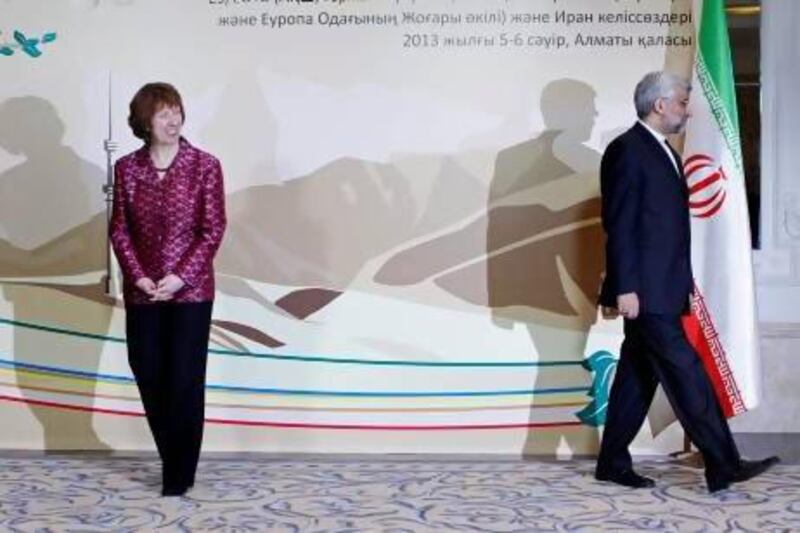Six world powers and Iran on Saturday failed to reach any agreement in talks aimed at easing concerns that Tehran may be trying to develop a nuclear weapons capability.
"It became clear our positions remain far apart" on substance, said Catherine Ashton, the European Union's foreign policy chief, after two days of negotiations. Russia said the two sides had not even agreed on a time and place for the next talks.
Few had expected significant progress in Almaty, the former capital of Kazakhstan, given that Iran is girding for presidential elections in June amid increasingly bitter political infighting between ruling conservative factions.
Western officials had avoided casting the two-day talks as the last hope to resolve the decade-old standoff. "There was no breakthrough but also no breakdown," a senior US official said, adding that the major powers intended to proceed with diplomatic efforts to solve the dispute.
But the failure to announce a date for follow-up talks "opens the door for those on both sides who want to pursue harder options", said Scott Lucas, an Iran expert at Birmingham University in England.
Even so, he added, while the process is now frozen, it did not end the chance for a diplomatic solution since US officials have said Iran is unable to build a bomb before the middle of next year, at the earliest.
Israel, believed to be the Middle East's sole nuclear-armed country, has also eased off thinly veiled threats it might attack Iran's nuclear installations this spring or summer.
But unless substantial progress is made soon after the Iranian elections, western governments are likely to slap new economic sanctions on Tehran while Israel will start rattling its sabres again, analysts said.
Western officials said on Friday the Iranians had given "no clear and concrete response" to proposals made by the world powers at talks in Almaty in February. These, intended as a first step to build confidence, offered Iran modest sanctions relief in return for halting the most sensitive part of its nuclear activities. Foremost was a call for Tehran to halt enriching uranium to 20 per cent and to send abroad or dilute its stockpile of that material while shuttering the virtually impregnable underground facility where it is produced.
The so-called P5+1 - the United States, China, Russia, Britain, France and Germany - held out the prospect of making greater concessions if Iran took bigger steps in further negotiations. But Iran wants a road map spelling out how and when its main concerns will be addressed before agreeing to any intermediate steps. Tehran demands that major sanctions are lifted and explicit western acceptance of its "right" to a domestic fuel cycle.
The international community insists Iran must first prove that its nuclear programme is, as Tehran insists, solely peaceful. But Iran's chief nuclear negotiator, Saeed Jalili, insisted on Saturday the onus was on the world powers to win the "confidence" of the Iranian people.
"We proposed our plan of action and the other party was not ready and they asked for some time to study the idea," Mr Jalili said.
Instead of responding directly to the P5+1's offer, Iran was said on Friday to have presented a "reworking" of proposals it made in Moscow last June. Iranian negotiators then offered to freeze production of 20 per cent-enriched uranium in return for a lifting of all sanctions - a deal promptly rejected by the international negotiators.





